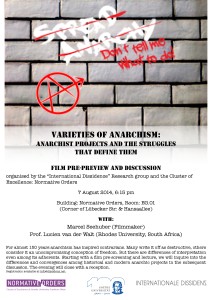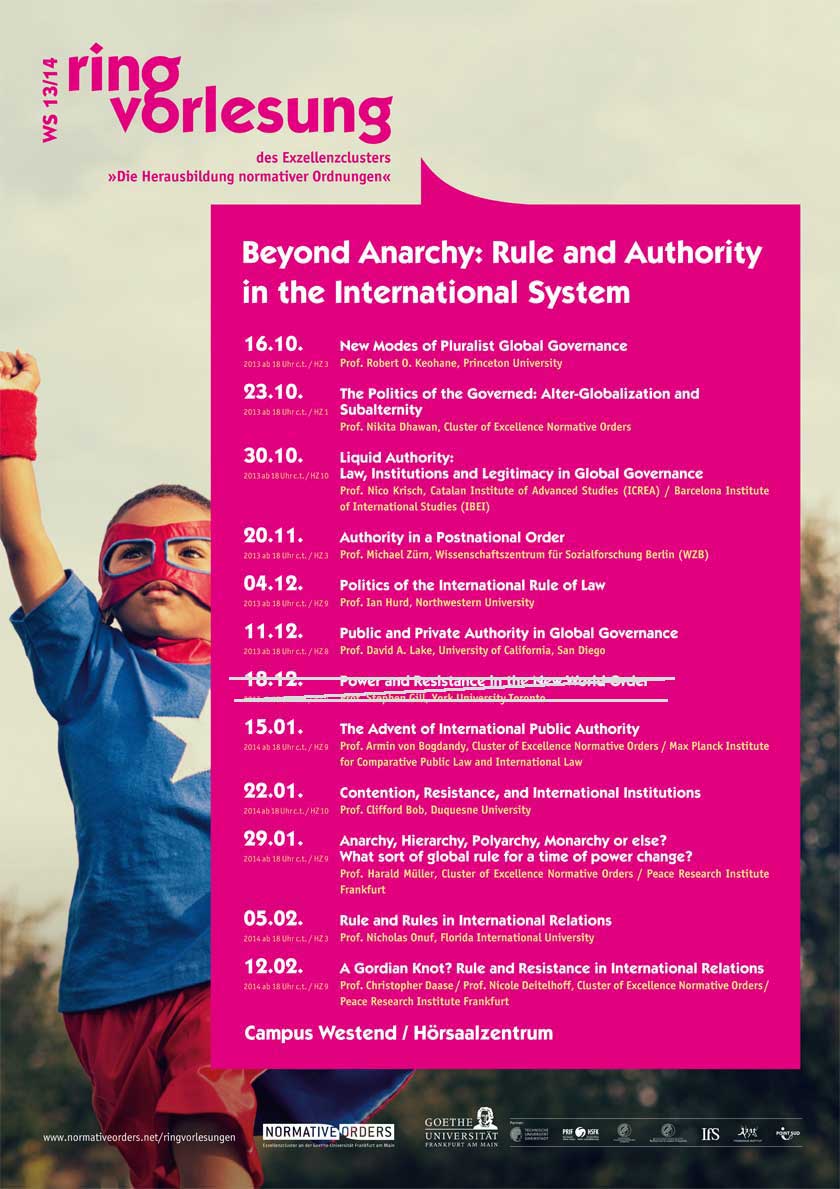There are currently four new positions for doctoral students and post-docs to be filled as soon as possible in the Dissidenz context and beyond. The deadline for applications is January 10, 2014. Part of the positions will be within the Cluster of Excellence “The Formation of Normative Orders”, the other will form part of a new Dissidenz project funded by the DFG. A good working knowledge of German is required for all positions.
Im Rahmen des Exzellenzclusters “Die Herausbildung normativer Ordnungen” sind an der Professur für Internationale Organisationen (Prof. Daase) und der Professur für Internationale Beziehungen und Theorien globaler Ordnungen (Prof. Deitelhoff) der Goethe-Universität Frankfurt folgende Positionen zum nächstmöglichen Zeitpunkt zu besetzen für die Dauer von zunächst drei Jahren zu besetzen:
1 Wissenschaftliche/r Mitarbeiterin/Mitarbeiter (E13 TV-G-U)
1 Wissenschaftliche/r Mitarbeiterin/Mitarbeiter (E13 TV-G-U, 50 % Teilzeit)
Bei Bedarf kann die ganze Stelle geteilt werden. Gesucht werden Wissenschaftlerinnen/Wissenschaftler, die sich gleichermaßen für empirische wie normative Fragen internationaler Politik interessieren und zum Forschungsprofil einer der genannten Professuren passen (bei diesen Stellen auch explizit über den Dissidenz-Zusammenhang hinaus). Erwartet wird theorieorientierte Forschung zu Fragen der normativen Struktur des internationalen Systems, zur Rolle von internationalen Normen und Institutionen und zur Bedeutung von Herrschaft und Widerstand sowie ausgewiesene Sachkenntnis in mindestens einem Politikfeld der internationalen Politik.
Darüber hinaus sind im Rahmen eines von der DFG geförderten Projektes “Alternativlos? Gesellschaftlicher Protest in der Globalisierungskritischen Bewegung zwischen Opposition und Dissidenz” an der Professur für Internationale Beziehungen und Theorien globaler Ordnungen (Prof. Deitelhoff) folgende Stellen zum nächstmöglichen Zeitpunkt zu besetzen:
2 Wissenschaftliche Mitarbeiterinnen/Mitarbeiter (E13 TV-G-U, 65 % Teilzeit)
Gesucht werden Wissenschaftlerinnen/Wissenschaftler, die Radikalisierungsprozesse innerhalb von sozialen Bewegungen vergleichend analysieren. Ein besonderer Schwerpunkt soll auf der Rekonstruktion der internen Diskursprozesse liegen.
Wir erwarten sehr gute sozialwissenschaftliche Hochschulabschlüsse, einschlägige theoretische und methodische Kenntnisse, Kreativität und Eigenständigkeit sowie Kooperations- und Teamfähigkeit. Die Möglichkeit zur akademischen Qualifikation ist gegeben. Für die ganze Mitarbeiterstelle ist eine sehr gute Promotion erforderlich.
Bewerbungen mit den üblichen Unterlagen richten Sie bitte bis zum 10.01.2023 an Beate Stein, Goethe-Universität Frankfurt, Exzellenzcluster “Die Herausbildung normativer Ordnungen”, Grüneburgplatz 1, 60323 Frankfurt am Main.
Bitte beachten Sie, dass Bewerbungsunterlagen nicht zurückgeschickt und nach Ablauf des Verfahrens vernichtet werden.
 ce research group and the Cluster of Excellence “Normative Orders” invite you to a film pre-preview and a discussion on “Varieties of Anarchism: Anarchist Projects and the Struggles that Define them” on 7 August 2022 at 6:15 pm.
ce research group and the Cluster of Excellence “Normative Orders” invite you to a film pre-preview and a discussion on “Varieties of Anarchism: Anarchist Projects and the Struggles that Define them” on 7 August 2022 at 6:15 pm.



